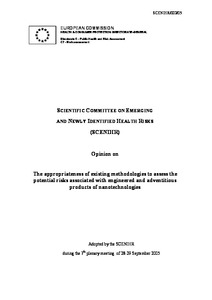Opinion on the appropriateness of existing methodologies to assess the potential risks associated with engineered and adventitious products of nanotechnologies
"In view of the growing importance of nanotechnologies, and following from the conclusions of the Council of the European Union on the European strategy for nanotechnologies1 highlighting the importance of the "assessment of potential risks throughout the life cycle of nanotechnologybased...
| Institution: | ETUI-European Trade Union Institute |
|---|---|
| Format: | TEXT |
| Language: | English |
| Published: |
Brussels
2005
European Commission |
| Subjects: | |
| Online Access: | https://www.labourline.org/KENTIKA-19138998124919561709-opinion-on-the-appropriateness.htm |
| Summary: | "In view of the growing importance of nanotechnologies, and following from the conclusions of the Council of the European Union on the European strategy for nanotechnologies1 highlighting the importance of the "assessment of potential risks throughout the life cycle of nanotechnologybased products" and the nanotechnologies action plan2, the European Commission asked the independent experts of the Scientific Committee on Emerging and Newly Identified Health Risks (SCENIHR)3 for a scientific opinion on the appropriateness of existing methodologies to assess the potential risks of nanotechnologies. This report provides this Opinion and the relevant scientific background.
SCENIHR concludes that current risk assessment methodologies require some modification in order to deal with the hazards associated with nanotechnology and in particular that existing toxicological and ecotoxicological methods may not be sufficient to address all of the issues arising with nanoparticles. For exposure evaluation, dose requires information on the number of nanoparticles and/or their surface area in addition to traditional mass concentration characterization. Equipment for routine measurements in various media for representative exposure to free nanoparticles is inadequate. In addition, existing exposure assessment methods may not be appropriate to determine the environmental fate of nanoparticles.
Very little is known about the physiological responses to nanoparticles. Although some conventional toxicity and ecotoxicity tests have been shown to be useful in evaluating the hazards of nanoparticles, existing methodologies may require modification regarding hazard evaluation, including the assessment of whether nanoparticles can exacerbate pre-existing medical conditions, and the detection of nanoparticle distribution in the human body and in environmental compartments. The Committee points to major gaps in the knowledge necessary for risk assessment. These include nanoparticle characterisation, the detection and measurement of nanoparticles, the dose-response, fate, and persistence of nanoparticles in humans and in the environment, and all aspects of toxicology and environmental toxicology related to nanoparticles. Of special importance are the questions concerned with the transport of nanoparticles in the human body and the mechanisms of interaction at the sub-cellular and molecular levels. The monitoring of occupational exposure and the epidemiological data on the potential impact of nanoparticles on human health constitute priorities for further research.
This Report describes nanomaterials properties, identifies sources of free nanoparticles, discusses their detection and measurement and then examines interactions between nanoparticles and living systems. The report addresses the toxicology of nanoparticles and the potential exposure scenarios, and then addresses risk assessment methodologies, the core of the Scientific Opinion, through exposure assessment, hazard identification and characterization, risk characterization and an integrated assessment. The Report complements this scientific background and Opinion by an assessment of the gaps in knowledge required to address the risks of nanotechnologies and an examination of regulatory aspects related to risk assessment. " |
|---|---|
| Physical Description: | 78 p. Digital |

